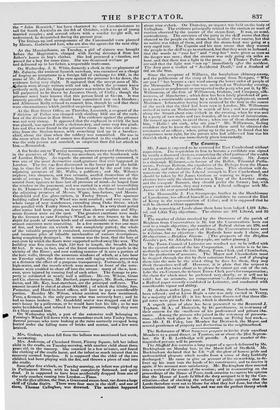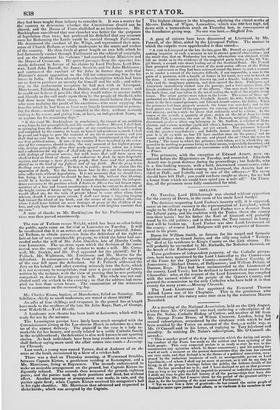The Reformers of West Somerset propose to invite their excellent
Members to a grand dinner, at Taunton, on or about the 21st Septem- ber. Sir T. B. Lethbridge will preside. A great number of dis- tinguished persons will be present. The Sheffield Iris contains a long report of a speech delivered by Mr. Buckingham on Monday last, in the Music-hall of Sheffield. Mr. Buckingham declared that he felt "all the glow of honest pride and uedissembled pleasure which results from a sense of duty faithfully discharged." He came to give an account of his stewardship, to de- liver up his trust into the hands of his constituents, and to receive it again, if his account were satisfactory. Mr. Buekingham then entered into a review of the events a the session ; and in mu/fleeting on the proceedings of the House of Peers, took occasion to express his opinion that the House of Lords fu'filled the duty assigned to it by the Con- stitution—that of checking the velocity of public opinion ; that the Lords therefore were not to blame for what they had done, but that the Constitution itself was in fault, and was not the perfect theory which
They had been taught from infancy to consider it. It was a matter for the country to determine whether the Constitution should not be altered, and the House of Peers abolished as an incumbrance. Mr. Buckingham considered that one chamber was better for the purposes of legislation than two; but professed his disbelief that any measure even for Reforming the Lords could be carried through Parliament. He denounced the conduct of the Whigs, and represented their mea- sures of Church Reform as totally inadequate to the wants and wishes of the country. He then dwelt at greet length on two bills which he bad fortunately carried through Parliament on the subject of copyright, and on the treatment his " claims " had received from Ministers and the house of Commons. Ile quoted passages from the speeches for- merly delivered in favour of his claims by Lord Durham, Lord Den. man, Lord John Russell, Sir James Scarlett, and Sir John Hobhouse ; and contrasted the conduct of Sir John in former days with that Minister's recent opposition to the bill for compensating him for his losses in India. Ile then adverted to the subscription which had been set on foot to purchase an annuity for himself and his wife ; and refer- ring to the enthusiastic reception he had met with in Liverpool, Manchester, Edinburgh, Dundee, Dublin, and other great towns, said
he could not believe it possible that they would refuse to answer nobly and liberally to the call made upon them by the people of Sheffield, who had done more than their shale. He never could believe that those who were realizing the profit of his exertions—who were enjoying the benefits which he had been at least very largely instrumental in procur- ing for them—would see him "trampled in the dust, without instantly rushing to his rescue, and giving him, at least, an independent home, as an asylum for his remaining days."
" If this (said Mr. Buckingham in conclusion), the utmost of my ambition or my hope, he but accomplished, and, like another Andrew Marvel, I shall find, as springing from the efforts and examples of my constituents, but followed up and completed by the country at large, an honest independence secured, I shall be proud and happy to pass the remnant of my life in your service; and you Sh al 1 find me ever true to the vows we mutually interchanged at the altar of our first political union. If not—if the country I have benefited by the exten- sion of her commerce, should in this, the very moment of her highest prospe- rity, arising principally from that newly-opened source, refuse use a honse and a subsistence for my age—I shall take my leave of her once-loved shores, with feelings of intensest sorrow, but with tears that will leave upon my cheek at least no blush of shame, and endeavour to find, in more hospitable regions, and among a more friendly people, that home and that protection denied me in the land of my fathers and of my faith. But the pang is too thrilling even to anticipate. To bear it in reality, would be almost like the separation of death. N et the brave know how to die; and the virtuous can even suffer exile without degradation. It is not necessary that we should live; but, living, it is essential we should be free; for life, without that blessing, would be a burden and a curse. If I cannot therefore acquire the indepen- dence necessary to the position which I desire to fill—a free and honest repre- sentative of a free and honest constituency—I must be content to abandon all the 'night visions of future utility and future happiness, which such a station would afford Me, for the toils of private labour in souse other clime, from whence, should I never again return, I shall cast many a lingering longing look toward the island of my birth, and the scenes of my earliest affections, where I shall leave behind me some hostages of peace in the children of my love, and only hope that their days may be cheered with brighter sunshine than my own."
A vote of thanks to Mr. Buckingham for his Parliamentary ser- vices was then passed unanimously.



























 Previous page
Previous page